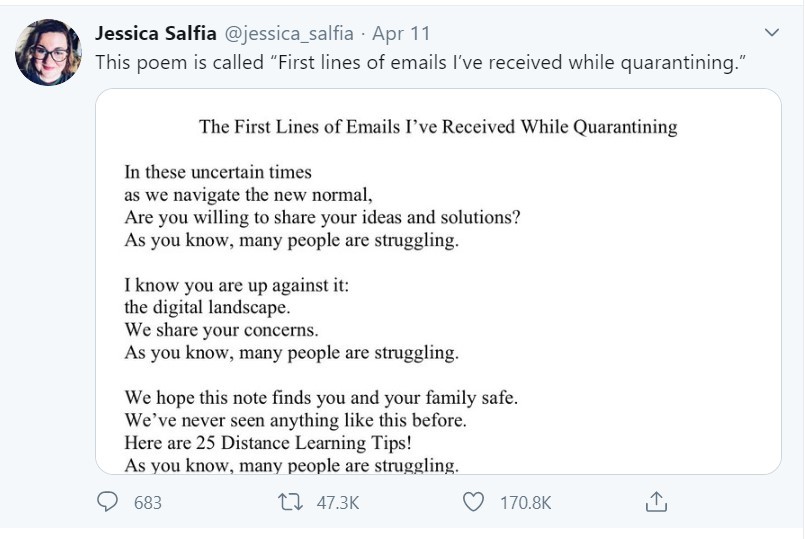Move from “handling the crisis” to “moving beyond the crisis.”
“I feel like I am in an eternal Wednesday,” a friend told me last week. He went on to describe how the COVID-19 pandemic has obliterated not only the line between the workday and the evening but also the line between weekday and weekend. Trapped in a continuous cycle of work, he shared that he was “exhausted” and “done.” He is not alone. Forty-five percent of employees in the U.S. report feeling burned out.
Since the start of the COVID-19 pandemic, the average workday in the U.S. has increased by three hours per day. In addition to trying to manage an increase in workload, many people are also facing increased demands on their time as they care for children who are home while schools, daycares, and summer camps remain closed, and care for elderly or sick family members. Simultaneously, people are cut off from key relationships and sources of support and are unable to decompress through typical outlets such as the gym or social events. The result is that people are working not only during the workday, but also in the mornings, nights, and weekends; “eternal Wednesday.”
Dr. Merete Wedell-Wedellsborg points to the three phases of crisis: emergency, regression, and recovery. In the emergency phase, there is energy and a sense of urgency and purpose. Collaboration and productivity increase as people instinctively pull together. Given the disruption and chaos that impacted work, life, and everything in between, the emergency phase of the COVID-19 pandemic was one on steroids.
Regression follows emergency. In the regression phase, people are tired, they lose their sense of purpose, and they start to fight about the small stuff—productivity and engagement decline. What’s more, the regression phase tends to be the most stressful phase for teams.
“Exhausted.” “Done.” “Burned out.” We are in the regression phase of crisis. To mitigate the performance drop, accelerating through regression to the recovery phase is critical.
To move the organization through regression, leaders need to shift the focus to the future. This means shifting the organization’s mindset from “handling the crisis” to “moving beyond the crisis.” Yes, there are many unknowns between now and “beyond the crisis,” but getting the organization to focus on the future will help re-energize and re-engage people and help accelerate the organization through regression. Further, by engaging the leadership team and the organization in developing a vision and a plan for the future, leaders have the opportunity to align the organization. An aligned organization will help move the organization through to recovery and will emerge stronger and ready for the future.
Avoid the “new normal”
The phrase “new normal” tops the list of pandemic words people hate. Yes, the COVID-19 pandemic has changed how we live and work. Some of these changes will be long-term; others will not. Critical issues, market realities, and even the roles and responsibilities may have changed, and they may continue to change. Rather than clump these changes together as the “new normal,” identify and reframe these changes as challenges and opportunities and place the focus forward. This will help shift the mindset of the team and move the organization forward.
 For a laugh
For a laugh
Finally, laughter is critical to learning, engagement, productivity, and creativity; it has, however, been a casualty of the pandemic. To move your organization forward, bring in laughter. Here are two poems that may help spur a chuckle, at the very least.
The first is a poem by Jessica Salfia, an English teacher and writer. It is aptly named “First lines of emails I’ve received while quarantining.” The second poem by Kasumi Yamazaki, CALL Researcher and Assistant Professor, is titled “Last lines of emails I’ve received while quarantining.”







